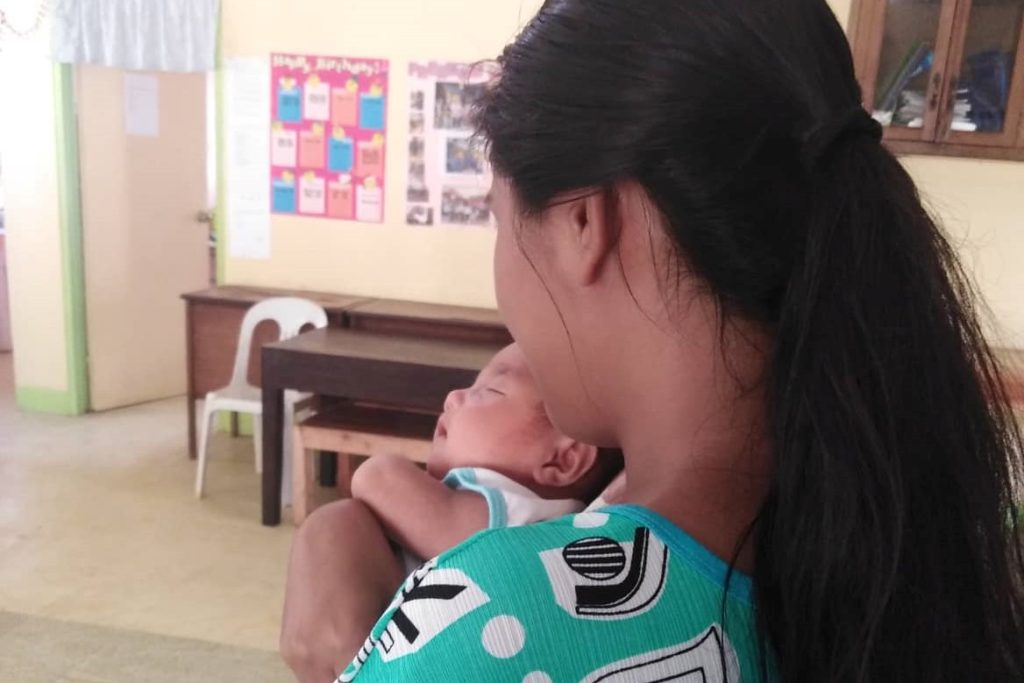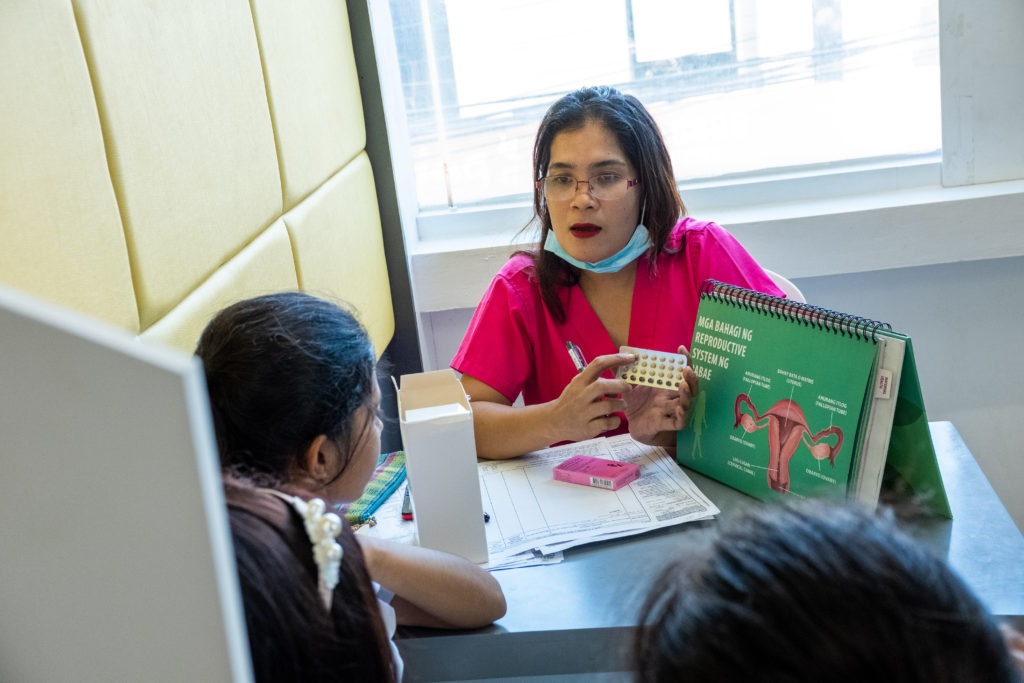Almost 200,000 Filipino teenage girls get pregnant every year. Here’s why that’s a problem.
by Alicia di Giovanni | Photo: Isabel Corthier
When 16-year-old Tina’s* water broke, it was the last thing the ninth grader expected to happen in her high school campus, just a few miles away from the city center. She had thought that she was only seven months pregnant. Because she’d never had an ultrasound, she had no idea that she had been pregnant for nine months already and that the baby was due.
Every two and a half minutes, a teenage girl like Tina gives birth in the Philippines. That’s 24 babies born to teen mothers in an hour, or 566 in a day—one of the highest teen pregnancy rates in the world.
As young girls lack access to education on sex and pregnancy, they are left in the dark, not knowing how to protect themselves from major life changes that they aren’t ready for. And, like in the case of Tina, early unplanned pregnancy can disrupt their education and put their own health at risk.
“As far as she knew, she was only seven months pregnant.”
Like Tina, teenagers in Palawan don’t receive enough sexual education. In fact, teenagers have little to no information on the health services available for young expecting mothers. Having a child at a young age can affect both your health and your baby’s too (Papri et al., 2016). This is an important area of concern as Tina is among hundreds of thousands of teenage girls in the Philippines who get pregnant every year. In fact, one out of every ten Filipino women between 15 and 19 years old is already a mother (Philippines National Demographic and Health Survey, 2013).
Help young people access high quality reproductive health care.
The age of consent in the Philippines is 12 years old. This, combined with the lack of education, makes the high number of early unplanned pregnancies in the Philippines not very surprising. Unfortunately, the number continues to grow. Palawan, meanwhile, has one of the highest teen pregnancy numbers among all provinces in the country.
Early unplanned pregnancy is harmful to one’s health. It is associated with an increased risk of maternal complications during pregnancy and delivery. Teenagers need to be aware of these risks so that they can try to avoid it altogether through contraception. Or, if they are already pregnant, they should access prenatal care throughout the pregnancy.
Health Risks for the Mother
Regular checkups are incredibly important during a pregnancy to monitor a mother’s and fetus’ health. Women who don’t seek medical care, are at higher risk of health problems and birth complications. This is exacerbated in teenage pregnancies. Girls younger than fifteen are more likely to develop anemia, or low blood iron, along with pregnancy-related high blood pressure (Jeha et al., 2015).
Low blood iron is more common for girls between the ages of 15 and 19 compared to women who are 20 to 44 (Jeha et al., 2015). This is because teenagers are less likely to receive the recommended healthy caloric intake required during pregnancy. It is important to receive qualified prenatal care to make sure your baby has the right amount of nutrients to prevent iron deficiencies.
Another risk for mothers during early unplanned pregnancies is high blood pressure, which can cause early delivery or low birth weight. This is not safe for mother and child and must be monitored closely by a health care professional.
Health Risks for the Baby

Low birth weight in newborns is common among young mothers. PHOTO BY SHEEN CUBILAN
Early pregnancy also increases health risks for newborns. Babies born to mothers under 20 years old face a higher risk of:
- low birth weight,
- early delivery and
- future health complications (Combs-Orme, 1993).
With the lack of early and regular prenatal care, these risks can be harmful to a baby, and can lead to death.
Help more moms raise healthy babies.
Low Birth Weight: Low birth weight in newborns is common among young mothers. Low birth weight can affect a child’s learning ability. Some may develop infections or other illnesses. Nearly ten percent of teenage mothers will deliver a low-birth weight baby. Babies born with a low-birth weight are then twenty times more likely to die in their first year of life, compared to babies of normal-weight (Kirchengast and Belizan, 2009).
Early Delivery (Premature Baby): A premature baby is one born before 36 weeks of pregnancy rather than 40 weeks. Premature babies miss out on the important growth and development that take place in the final weeks of pregnancy. Early unplanned pregnancies are more likely to result in premature birth. This is due to lack of nutrients and prenatal care necessary for the full 40-weeks of pregnancy (Khashan, Baker and Kenny, 2010).
Baby Health Complications: When organs don’t have enough time to develop, babies may suffer from health problems such as:
- breathing problems;
- developmental delay;
- hearing issues;
- vision issues;
- difficulties with feeding; and
- other health complications (Papri et al., 2016).
“As young girls lack access to education on sex and pregnancy, they are left in the dark, not knowing how to protect themselves from major life changes that they aren’t ready for”
Early unplanned pregnancies also affect mental health. As a young teenager, and without education on sex and pregnancy, it can be a scary experience to find out you’re pregnant. Young pregnant women have greater emotional and social needs compared to older ones. This is usually because young girls feel unprepared and unsure on what to expect. Young mothers are less likely to finish school, experience higher rates of depression after birth, live in poverty, and have children who experience developmental problems (Combs-Orme, 1993).
Why don’t teenagers seek medical advice?
Many teens moms don’t access the health services available to them and don’t visit the doctor throughout the duration of their pregnancy. This is usually due to a combination of:
- embarrassment or shame;
- no time;
- lack of education;
- lack of money; and
- lack of awareness.
Low health-seeking behavior is a major health risk, especially for early unplanned pregnancies. It increases the risk of pregnancy related complications and harms the unborn child (Neal, Channon and Chintsanya, 2018). It is important to have consistent health care to minimize these risks.
What can we do?

At our new youth-friendly clinic, our nurse Daisy explains how contraceptives work to a group of girls. PHOTO BY ISABEL CORTHIER
Early unplanned pregnancies require comprehensive prenatal care from the start to ensure a healthy baby. Risks of early unplanned pregnancies can be avoided altogether when teens have access to reproductive health information and services.
This is why Roots of Health opened a youth clinic in the Puerto Princesa city center as a place to ask questions, seek support and access services. That’s why Roots of Health exists–to provide reproductive health services in Palawan, offering a place of support and knowledge. The team and professionals at Roots of Health ensure to encourage good prenatal care, while keeping in mind the developmental and personal needs of the teenagers.
Roots of Health aims to ensure that all women are aware and have access to contraception to help prevent the number of unplanned pregnancies in Palawan. To support our health education programs to help young people prevent early unplanned pregnancies pregnancies, support our work here.
*Additional reporting by: Amie Perez
Sources:
Combs-Orme, T. (1993). Health Effects of Adolescent Pregnancy: Implications for Social Workers. Families in Society: The Journal of Contemporary Social Services, 74(6), pp.344-354.
Jeha, D., Usta, I., Ghulmiyyah, L. and Nassar, A. (2015). A review of the risks and consequences of adolescent pregnancy. Journal of Neonatal-Perinatal Medicine, 8(1), pp.1-8.
Khashan, A., Baker, P. and Kenny, L. (2010). Preterm birth and reduced birthweight in first and second teenage pregnancies: a register-based cohort study. BMC Pregnancy and Childbirth, 10(1).
Kirchengast, S. and Belizan, J. (2009). Editorial: Teenage Pregnancies, a Current Global Health and Social Problem. Current Women’s Health Reviews, 5(1).
Natividad, J. (2013). Teenage Pregnancy in the Philippines: Trends, Correlates and Data Sources. Journal of the ASEAN Federation of Endocrine Societies, 28(1), pp.30-37.
Neal, S., Channon, A. and Chintsanya, J. (2018). The impact of young maternal age at birth on neonatal mortality: Evidence from 45 low and middle income countries. Plos One, 13(5), pp.5-32.
Papri, F., Khanam, Z., Ara, S. and Panna, M. (2016). Adolescent Pregnancy: Risk Factors, Outcome and Prevention. Chattagram Maa-O-Shishu Hospital Medical College Journal, 15(1), pp.53-56.
Philippines National Demographic and Health Survey 2013. (2013). Studies in Family Planning, 42(3), pp.227-232.





